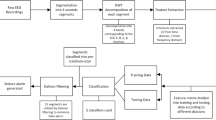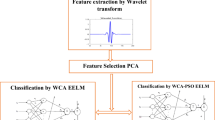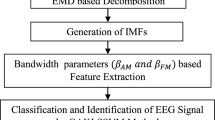Abstract
In this paper, a novel hierarchical multi-class SVM (H-MSVM) with extreme learning machine (ELM) as kernel is proposed to classify electroencephalogram (EEG) signals for epileptic seizure detection. A clinical EEG benchmark dataset having five classes, obtained from Department of Epileptology, Medical Center, University of Bonn, Germany, is considered in this work for validating the clinical utilities. Wavelet transform-based features such as statistical values, largest Lyapunov exponent, and approximate entropy are extracted and considered as input to the classifier. In general, SVM provides better classification accuracy, but takes more time for classification and also there is scope for a new multi-classification scheme. In order to mitigate the problem of SVM, a novel multi-classification scheme based on hierarchical approach, with ELM kernel, is proposed. Experiments have been conducted using holdout and cross-validation methods on the entire dataset. Metrics namely classification accuracy, sensitivity, specificity, and execution time are computed to analyze the performance of the proposed work. The results show that the proposed H-MSVM with ELM kernel is efficient in terms of better classification accuracy at a lesser execution time when compared to ANN, various multi-class SVMs, and other research works which use the same clinical dataset.





Similar content being viewed by others
References
Acharya UR, Molinari F, Sree SV, Chattopadhyay S (2012) Automatic diagnosis of epileptic EEG using entropies. Biomed Signal Process Control 7(4):401–408
Adeli H, Zhou Z, Dadmehr N (2003) Analysis of EEG records in an epileptic patient using wavelet transform. J Neurosci Methods 123:69–87
Andrzejak RG, Lehnertz K, Rieke C (2001) Indications of nonlinear deterministic and finite dimensional structures in time series of brain electrical activity: dependence on recording region and brain state. Phys Rev E 64(6):061907
Andrzejak RG, Widman G, Lehnertz K (2001) The epileptic process as nonlinear deterministic dynamics in a stochastic environment: an evaluation on mesial temporal lobe epilepsy. Epilepsy Res 44:129–140
Chandaka S, Chatterjee A, Munshi S (2009) Cross-correlation aided support vector machine classifier for classification of EEG signals. Expert Syst Appl 36(2):1329–1336
Diambra L, Figueiredo J, Malta C (1999) Epileptic activity recognition in EEG recording. Phys A Stat Mech Appl 273(3–4):495–505
Erfanian A, Mahmoudi B (2005) Real-time ocular artifact suppression using recurrent neural network for electro-encephalogram based brain–computer interface. Med Biol Eng Comput 43:296–305
Foo SY, Stuart G, Harvey B, Meyer Baese A (2002) Neural network based EEG pattern recognition. Eng Appl Artif Intell 15:253–260
Frenay B Verleysen M (2010) Using SVMs with randomised feature spaces: an extreme learning approach. In: Proceedings of the ESANN, pp 315–320
Gotman J, Flanagah D, Zhan J, Rosenblat B (1997) Automatic seizure detection in the newborn: methods and initial evaluation. Electroencephalogr Clin Neurophysiol 103:356–362
Guler I, Ubeyli (2009) Multiclass support vector machines for EEG-signals classification. IEEE Trans Inf Technol Biomed 11(2):117–126
Guler N, Ubeyli E, Guler I (2005) Recurrent neural networks employing Lyapunov exponents for EEG signals classification. Expert Syst Appl 29(3):506–514
Guo L, Riveero D, Pazaos A (2010) Epileptic seizure detection using multiwavelet transform based approximate entropy and artificial neural networks. J Neurosci Methods 193:156–163
Guo L, Rivero D, Dorado J, Rabunal JR, Pazos A (2010) Automatic epileptic Seizure detection in EEG based on line length feature and artificial neural network. J Neurosci Methods 191:101–109
Hasan O (2009) Automatic detection of epileptic seizures in EEG using discrete wavelet transform and approximate entropy. Expert Syst Appl 36:52027–52036
He P, Wilson G, Russel C (2004) Removal of ocular artifacts from electro-encephalogram by adaptive filtering. Med Biol Eng Comput 42(3):407–412
Hsu KC, Yu SN (2010) Detection of seizures in EEG using subband nonlinear parameters and genetic algorithm. Comput Biol Med 40:823–830
Huang GB, Zhu QY, Siew CK (2006) Extreme learning machine: theory and applications. Neurocomputing 70:489–501
Hwang H-J, Kim K-H, Jung Y-J, Kim D-W, Lee Y-H, Im, C-H (2011) An EEG-based real-time cortical functional connectivity imaging system. Med Biol Eng Comput 49(9):985–995
Iscan Z, Dokur Z, Demiralap T (2011) Classification of electroencephalogram signals with combined time and frequency features. Expert Syst Appl 38:10499–10505
Jahankhani P, Kodogiannis V, Revett K (2006) EEG signal classification using wavelet feature extraction and neural networks. In: IEEE John Vincent Atanasoff 2006 international symposium on modern computing, pp 52–57
Jennifer C, John GG, Phil HJ, Griffiths Clive J, Drinnan Michael J (2006) Comparison of manual sleep staging with automated neural network-based analysis in clinical practice. Med Biol Eng Comput 44(1/2):105–110
Kalayci T, Ozdamar O (1995) Wavelet preprocessing for automated neural network detection of EEG spikes. IEEE Eng Med Biol Mag 14(2):160–166
Kannathal N, Choo ML, Acharya UR, Sadasivan PK (2005) Entropies for detection of epilepsy in EEG. Comput Methods Programs Biomed 80:187–194
Kannathal N, Choo M, Acharya U, Sadasivan P (2005) Entropies for detection of epilepsy in EEG. Comput Methods Programs Biomed 80(3):187–194
Khan YU, Gotman J (2003) Wavelet based automatic seizure detection in intracerebral electroencephalogram. Clin Neurophysiol 114:898–908
Kiymik MK, Akin M, Subasi A (2004) Automatic recognition of alertness level by using wavelet transform and artificial neural network. J Neurosci Methods 139:231–240
Kiymik MK, Subasi A, Ozcalik HR (2004) Neural networks with periodogram and autoregressive spectral analysis methods in detection of epileptic seizure. J Med Syst 28(6):511–522
Liang SF, Wang HC, Chang WL (2010) Combination of EEG complexity and spectral analysis for epilepsy diagnosis and seizure detection. In: EURASIP journal on advances in signal processing, p 853434
Liu A, Hahn JS, Heldt GP, Coen RW (1992) Detection of neonatal seizures through computerized EEG analysis. Electroencephalogr Clin Neurophysiol 82:30–37
McSharry PE, He T, Smith LA, Tarassenko L (2002) Linear and non-linear methods for automatic seizure detection in scalp electro-encephalogram recordings. Med Biol Eng Comput 40:447–461
Miche Y, Sorjamaa A, Bas P, Simula O, Jutten C, Lendasse A (2010) OP-ELM: optimally pruned extreme learning machine. IEEE Trans Neural Netw 21(1):158–162
Mohseni H, Maghsoudi A, Kadbi M, Hashemi J, Ashourvan A (2006) Automatic detection of epileptic seizure using time–frequency distributions. In: IET 3rd international conference on advances in medical, signal and information processing, vol 14
Nicolaou N, Georgiou J (2012) Detection of epileptic electroencephalogram based on permutation entropy and support vector machine. Expert Syst Appl 39:202–209
Nigam V, Graupe D (2004) A neural-network-based detection of epilepsy. Neurol Res 26(1):55–60
Ocak H (2009) Automatic detection of epileptic seizures in EEG using discrete wavelet transform and approximate entropy. Expert Syst Appl 36(2):2027–2036
Peltoranta M, Pfurtscheller G (1994) Neural network based classification of non-averaged event-related EEG responses. Med Biol Eng Comput 32:189–196
Petrosian A, Prokhorov D, Homan R, Dashei R, Wunsch D (2000) Recurrent neural network based prediction of epileptic seizures in intra and extracranial EEG. Neurocomputing 30:201–218
Pincus SM (1991) Approximate entropy as a measure of system complexity. Proc Natl Acad Sci USA 88:2297–2301
Radhakrishnan N, Gangadhar B (1998) Estimating regularity in epileptic seizure time-series data: a complexity-measure approach. IEEE Eng Med Biol 17(3):89–94
Schaltenbrand N, Lengelle R, Toussaint M (1996) Sleep stage scoring using the neural network model: comparison between visual and automatic analysis in normal subjects and patients. Sleep 19(1):26–35
Srinivasan V, Eswaran C, Sriraam N (2005) Artificial neural network based epileptic detection using time-domain and frequency-domain features. J Med Syst 29(6):647–660
Subasi A (2005) Epileptic seizure detection using dynamic wavelet network. Expert Syst Appl 29(2):343–355
Subasi A (2006) Automatic detection of epileptic seizure using dynamic fuzzy neural networks. Expert Syst Appl 31:320–328
Subasi A (2007) Application of adaptive neuro-fuzzy inference system for epileptic seizure detection using wavelet feature extraction. Comput Biol Med 37(2):227–244
Subasi A (2007) EEG signal classification using wavelet feature extraction and a mixture of expert model. Expert Syst Appl 32(4):1084–1093
Subasi A, Gursoy MI (2010) EEG signal classification using PCA, ICA, LDA and support vector machine. Expert Syst Appl 37:8659–8666
Tzallas A, Tsipouras M, Fotiadis D (2007) Automatic seizure detection based on time–frequency analysis and artificial neural networks. Comput Intell Neurosci 13, Article ID 80510
Ubeyli E (2006) Analysis of EEG signals using Lyapunov exponents. Neural Netw World 16(3):257–273
Ubeyli E (2006) Fuzzy similarity index employing Lyapunov exponents for discrimination of EEG signals. Neural Netw World 16(5):421–431
Ubeyli ED (2010) Least square support vector machine employing model-based methods coefficients for analysis of EEG signals. Expert Syst Appl 37:233–239
Varun J, Ram Bilas P, Antony V (2014) Classification of ictal and seizure-free EEG signals using fractional linear prediction. Biomed Signal Process Control 9:1–5
Williams CKI (1998) Computation with infinite neural networks. Neural Comput 10:1203–1216
Zarjam P, Mesbah M, Boashash B (2003) Detection of newborns EEG seizure using optimal features based on discrete wavelet transform. Proc IEEE Int Conf Acoust Speech Signal Process 2:265–268
Acknowledgments
The authors wish to thank Andrzejak et al. [3], for the EEG dataset available: (http://www.meb.unibonn.de/epileptologie/science/physik/eegdata.html) and Neurology Department of Sri Ramakrishna Hospital, Coimbatore, India.
Author information
Authors and Affiliations
Corresponding author
Rights and permissions
About this article
Cite this article
Murugavel, A.S.M., Ramakrishnan, S. Hierarchical multi-class SVM with ELM kernel for epileptic EEG signal classification. Med Biol Eng Comput 54, 149–161 (2016). https://doi.org/10.1007/s11517-015-1351-2
Received:
Accepted:
Published:
Issue Date:
DOI: https://doi.org/10.1007/s11517-015-1351-2




